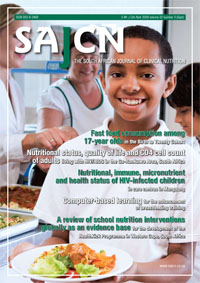Computer-based learning for the enhancement of breastfeeding training
Keywords:
Breastfeeding, computer-based learning, health care workers
Abstract
A great need exists for ongoing breastfeeding training. Students of today relate well to computers in the learning environment. In this study computer-based learning (CBL) was explored in the context of breastfeeding training. Aim: To adapt and validate an Indian computer-based undergraduate breastfeeding training module for use by South African (SA) undergraduate dietetic students. Methods and materials: The Indian module was adapted to suit the SA scenario and converted into low-bandwidth, interactive computer-based material. It was assessed for face and content validity by 19 peer reviewers and 17 third year Stellenbosch University (SU) dietetic students by means of self-administered questionnaires. Impact of the adapted module on knowledge was evaluated on second year SU (n=14) and University of the Western Cape (n=15) dietetic students by means of pre- and post tests. Results: All reviewers rated their IT skills as sufficient and enjoyed the presentation mode of the adapted module. Third year students indicated that CBL was a “nice way of learning”, but requested that it should not be used as the sole source of instruction. The majority of the reviewers (53%, n=19) rated CBL to be equally effective compared to conventional lectures, 35% rated it as being more effective and 11% as less effective. Knowledge test scores showed a significant increase (SU p<0.0001 and UWC p<0.00115). Conclusion: It is recommended that validated computer-based breastfeeding training modules be integrated as part of multi-media methods to increase coverage and enhance breastfeeding learning for undergraduate dietetic students, other students of health care professions and health care workers.
Published
2009-07-26
How to Cite
Du Plessis, L., Marais, D., Labadarios, D., & Singh, T. (2009). Computer-based learning for the enhancement of breastfeeding training. South African Journal of Clinical Nutrition, 22(3), 137. Retrieved from http://sajcn.redbricklibrary.com/index.php/SAJCN/article/view/338
Issue
Section
Original Research
Material submitted for publication in the South African Journal of Clinical Nutrition (SAJCN) is accepted provided it has not been published elsewhere. Copyright forms will be sent with acknowledgement of receipt and the SAJCN reserves copyright of the material published.
The SAJCN does not hold itself responsible for statements made by the authors.


